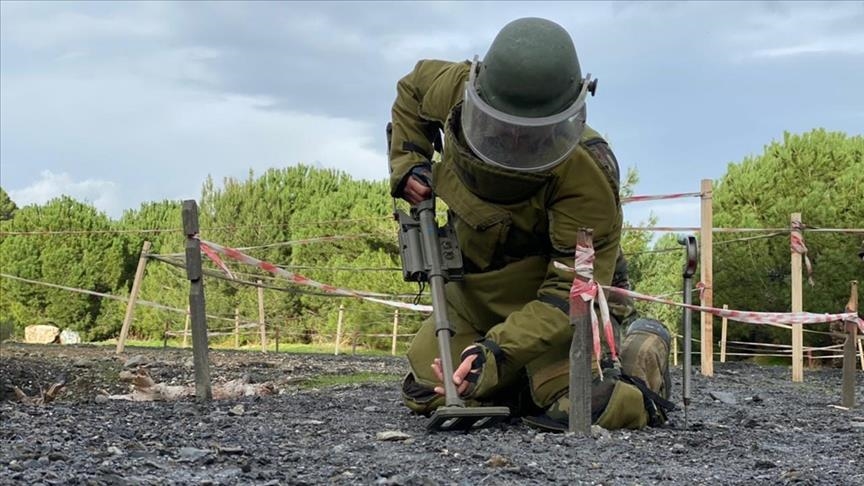Importance of mine action for global development
Mine-free world is vital for social-economic development of least developed countries

ANKARA
According to United Nations Development Programme (UNDP), presently, landmines, cluster munitions, and explosive remnants of war (ERW) are found in over 70 countries and seven territories.
It is essential to conceive that most countries and territories affected by these weapons are among the least developed countries. These weapons not only claimed hundreds of thousands of lives, mostly civilians, over the last decades and constitute an imminent deadly threat to millions of people’s lives and livelihoods. Only in 2020, the UN recorded 4,663 civilian casualties caused by mines, ERWs, and cluster munitions. They also have a significant negative impact on post-conflict recovery and development as they undermine aid distribution, land cultivation, and construction and restoration of infrastructure and housing facilities.
The effect of these weapons on human lives and economic-social development came to be widely acknowledged from the 1980s onwards and consequently paved the way to the development of international and national mine action programs and worldwide campaigns, promoted by celebrities like Princess Diana and Paul McCartney, to ban anti-personnel mines and cluster munitions. As such, from the early 1990s on pioneering mine action programs, with the help of international bodies such as the EU, UNDP, and mine action NGOs like the Mine Advisory Group (MAG) Handicap International, and Norwegian People’s Aid, were initiated in some of the worst mine-affected countries, including Afghanistan, Bosnia and Herzegovina, Cambodia, Mozambique.
Furthermore, worldwide advocacy efforts resulted with the development of the Ottawa Treaty, also known as the Anti-Personnel Mine Ban Convention, to which 164 are party as of today, in 1997 and the Convention on Cluster Munitions (CCM), which was ratified or acceded by 110 states as of September 2020, in 2008. These two include solid recovery arrangements for individual victims and affected communities and preventive actions banning the use, production and transfer of these weapons as well as entailing their destruction, efforts generally known as mine action. Mine action, which deals with landmines, cluster munitions and ERW, led to several countries previously affected by these weapons being able to declare themselves in full compliance with clearance obligations.
According to data compiled by Mine Action Review, as of 2020, 32 states fulfilled their obligations under Article 5 of the Ottawa Treaty and became completely mine-free. State parties to the treaty also have destroyed over 55 million stockpiled anti-personnel mines. Accordingly, both the number of humans killed or disabled by these weapons and the size of contaminated areas significantly decreased, which is a very positive development. That said, the COVID-19 pandemic impacted global mine action efforts as it did in many other domains. De-mining works in Croatia, Ukraine, Iraq, Cambodia slowed down due to halting operations under national lockdowns, travel restrictions, and difficulties in employment in international experts.
However, the more dangerous threat to mine action has come from the eruption of new armed clashes and wars, in which the use of anti-personnel mines is very likely. As the recent Azerbaijan-Armenia war on the Upper-Karabakh revealed, during which the Armenian side extensively used mines and cluster munitions, some states still have the tendency to use this cheap yet inhuman weapon.
Moreover, decently, escalated armed conflicts in Mali, Eritrea, and Ethiopia, ongoing armed clashes in Mozambique and Nigeria between government forces and terror organizations and the possibility of armed violence in Myanmar risks re-proliferation of mines. Because most of the armed hostilities erupt in the least developed countries and involve terrorist organizations, which are not parties to any convention on banning mines, the international community should do more to halt the production of the landmines and immediate destruction of stockpiled mines.
Anadolu Agency website contains only a portion of the news stories offered to subscribers in the AA News Broadcasting System (HAS), and in summarized form. Please contact us for subscription options.


